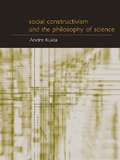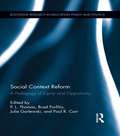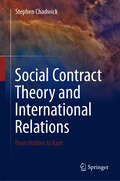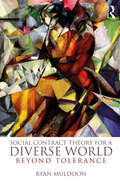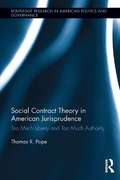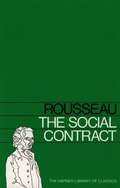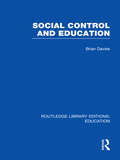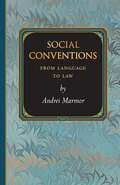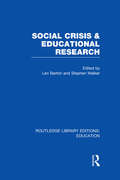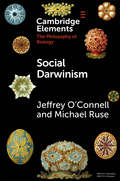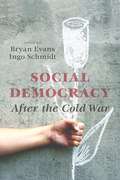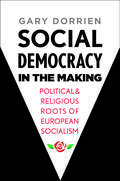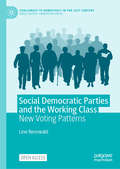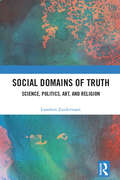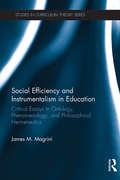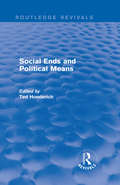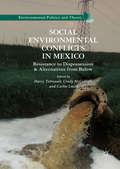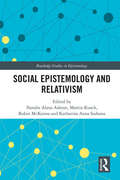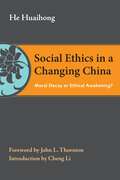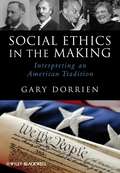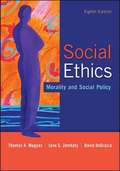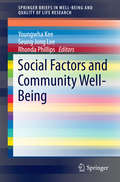- Table View
- List View
Social Constructivism and the Philosophy of Science (Philosophical Issues in Science)
by André KuklaSocial constructionists maintain that we invent the properties of the world rather than discover them. Is reality constructed by our own activity? Do we collectively invent the world rather than discover it?André Kukla presents a comprehensive discussion of the philosophical issues that arise out of this debate, analysing the various strengths and weaknesses of a range of constructivist arguments and arguing that current philosophical objections to constructivism are inconclusive. However, Kukla offers and develops new objections to constructivism, distinguishing between the social causes of scientific beliefs and the view that all ascertainable facts are constructed.
Social Context Reform: A Pedagogy of Equity and Opportunity (Routledge Research in Education Policy and Politics #5)
by Julie Gorlewski P. L. Thomas Brad Porfilio Paul R. CarrCurrently, both the status quo of public education and the "No Excuses" Reform policies are identical. The reform offers a popular and compelling narrative based on the meritocracy and rugged individualism myths that are supposed to define American idealism. This volume will refute this ideology by proposing Social Context Reform, a term coined by Paul Thomas which argues for educational change within a larger plan to reform social inequity—such as access to health care, food, higher employment, better wages and job security. Since the accountability era in the early 1980s, policy, public discourse, media coverage, and scholarly works have focused primarily on reforming schools themselves. Here, the evidence that school-only reform does not work is combined with a bold argument to expand the discourse and policy surrounding education reform to include how social, school, and classroom reform must work in unison to achieve goals of democracy, equity, and opportunity both in and through public education. This volume will include a wide variety of essays from leading critical scholars addressing the complex elements of social context reform, all of which address the need to re-conceptualize accountability and to seek equity and opportunity in social and education reform.
Social Contract Theory and International Relations: From Hobbes to Kant
by Stephen ChadwickThis book provides a systematic analysis of Hobbes, Locke, Rousseau and Kant with respect to international relations. These philosophers belong to the social contract tradition and are considered some of the most influential political theorists. Their ideas have played a role in the formation of national political constitutions and remain very influential both in understanding and legitimising the structure of societies around the world. This book is an innovative analysis of what these thinkers have claimed regarding the relationship between nation states, rather than contributing to the established scholarship on what they have said about individual political societies. Specifically, individual chapters examine war and peace, world governance, inequality, and terrorism.
Social Contract Theory for a Diverse World: Beyond Tolerance
by Ryan MuldoonVery diverse societies pose real problems for Rawlsian models of public reason. This is for two reasons: first, public reason is unable accommodate diverse perspectives in determining a regulative ideal. Second, regulative ideals are unable to respond to social change. While models based on public reason focus on the justification of principles, this book suggests that we need to orient our normative theories more toward discovery and experimentation. The book develops a unique approach to social contract theory that focuses on diverse perspectives. It offers a new moral stance that author Ryan Muldoon calls, "The View From Everywhere," which allows for substantive, fundamental moral disagreement. This stance is used to develop a bargaining model in which agents can cooperate despite seeing different perspectives. Rather than arguing for an ideal contract or particular principles of justice, Muldoon outlines a procedure for iterated revisions to the rules of a social contract. It expands Mill's conception of experiments in living to help form a foundational principle for social contract theory. By embracing this kind of experimentation, we move away from a conception of justice as an end state, and toward a conception of justice as a trajectory. Listen to Robert Talisse interview Ryan Muldoon about Social Contract Theory for a Diverse World on the podcast, New Books in Philosophy: http://tinyurl.com/j9oq324 Also, read Ryan Muldoon’s related Niskanen Center article, "Diversity and Disagreement are the Solution, Not the Problem," published Jan. 10, 2017: https://niskanencenter.org/blog/diversity-disagreement-solution-not-problem/
Social Contract Theory in American Jurisprudence: Too Much Liberty and Too Much Authority (Routledge Research in American Politics and Governance)
by Thomas R. PopeDespite decades of attempts and the best intentions of its members, the United States Supreme Court has failed to develop a coherent jurisprudence regarding the state’s proper relationship to the individual. Without some objective standard upon which to ground jurisprudence, decisions have moved along a spectrum between freedom and authority and back again, affecting issues as diverse as individual contractual liberties and the right to privacy. Social Contract Theory in American Jurisprudence seeks to reintroduce the lessons of modern political philosophy to offer a solution for this variable application of legal principle and to lay the groundwork for a jurisprudence consistent in both theory and practice. Thomas R. Pope’s argument examines two exemplary court cases, Lochner v. New York and West Coast Hotel v. Parrish, and demonstrates how the results of these cases failed to achieve the necessary balance of liberty and the public good because they considered the matter in terms of a dichotomy. Pope explores our constitution’s roots in social contract theory, looking particularly to the ideas of Thomas Hobbes for a jurisprudence that is consistent with the language and tradition of the Constitution, and that is also more effectually viable than existing alternatives. Pope concludes with an examination of recent cases before the Court, grounding his observations firmly within the developments of ongoing negotiation of jurisprudence. Addressing the current debate between individual liberty and government responsibility within the context of contemporary jurisprudence, Pope considers the implications of a Hobbesian founding for modern policy. This book will be particularly relevant to scholars of Constitutional Law, the American Founding, and Modern Political Theory.
Social Contract: & Discourses
by Jean Jacques RousseauWise men, if they try to speak their language to the common herd instead of its own, cannot possibly make themselves understood. There are a thousand kinds of ideas which it is impossible to translate into popular language. Conceptions that are too general and objects that are too remote are equally out of its range: each individual, having no taste for any other plan of government than that which suits his particular interest, finds it difficult to realize the advantages he might hope to draw from the continual privations good laws impose. -from VII: "The Legislator" How does human nature impact politics and government? What is the "social contract," and what are our obligations to it? Is the "general will" infallible? What are the limits of sovereign power? What are the marks of "good government"? What constitutes the death of the body politic? How can we check the usurpations of government? Swiss philosopher JEAN-JACQUES ROUSSEAU (1712-1778) was a dramatic influence on the French revolution, 19th-century communism, the American Founding Fathers, and much modern political thought, primarily through this 1762 work, his most influential. Here, he explores concepts of civil society, human sovereignty, and effective government that continue to be debated-and not yet settled-in the 21st century. A classic of modern thought, this is required reading for anyone wishing to be considered well educated.
Social Control and Education: Class Inscription And Symbolic Control (Routledge Library Editions: Education)
by Brian DaviesSocial control is a central sociological concept which has generated many influential ‘models’ of man in society. This book examines these major models, and examines the rise of compulsory schooling in Britain and the USA and shows us which aspects of education and social control have been elaborated or neglected in the sociology of education down to the mid 1970s.
Social Conventions: From Language to Law (Princeton Monographs in Philosophy #25)
by Andrei MarmorSocial conventions are those arbitrary rules and norms governing the countless behaviors all of us engage in every day without necessarily thinking about them, from shaking hands when greeting someone to driving on the right side of the road. In this book, Andrei Marmor offers a pathbreaking and comprehensive philosophical analysis of conventions and the roles they play in social life and practical reason, and in doing so challenges the dominant view of social conventions first laid out by David Lewis. Marmor begins by giving a general account of the nature of conventions, explaining the differences between coordinative and constitutive conventions and between deep and surface conventions. He then applies this analysis to explain how conventions work in language, morality, and law. Marmor clearly demonstrates that many important semantic and pragmatic aspects of language assumed by many theorists to be conventional are in fact not, and that the role of conventions in the moral domain is surprisingly complex, playing mostly an auxiliary and supportive role. Importantly, he casts new light on the conventional foundations of law, arguing that the distinction between deep and surface conventions can be used to answer the prevalent objections to legal conventionalism. Social Conventions is a much-needed reappraisal of the nature of the rules that regulate virtually every aspect of human conduct.
Social Crisis and Educational Research (Routledge Library Editions: Education)
by Stephen Walker Len BartonOriginally written at a time of crisis in the education system of Britain – occasioned by cuts, contradictions and change - many of the issues discussed in this book are still relevant today. Debate in the book focuses upon an examination of the nature of the crisis, an exploration of the impact of the crisis upon school processes and upon the relationship between life in school and in the wider community, an investigation of the responses being made by pupils, teachers and educationalists to the day-to-day manifestations of the crisis and a consideration of how the current crisis is giving a particular poignancy to issues to do with the theories and methods employed in our study and interpretation of contemporary educational processes.
Social Darwinism (Elements in the Philosophy of Biology)
by Michael Ruse Jeffrey O'ConnellThis Element is a philosophical history of Social Darwinism. It begins by discussing the meaning of the term, moving then to its origins, paying particular attention to whether it is Charles Darwin or Herbert Spencer who is the true father of the idea. It gives an exposition of early thinking on the subject, covering Darwin and Spencer themselves and then on to Social Darwinism as found in American thought, with special emphasis on Andrew Carnegie, and Germany with special emphasis on Friedrich von Bernhardi. Attention is also paid to outliers, notably the Englishman Alfred Russel Wallace, the Russian Peter Kropotkin, and the German Friedrich Nietzsche. From here we move into the twentieth century looking at Adolf Hitler - hardly a regular Social Darwinian given he did not believe in evolution - and in the Anglophone world, Julian Huxley and Edward O. Wilson, who reflected the concerns of their society.
Social Democracy After the Cold War
by Bryan Evans Ingo SchmidtDespite the market triumphalism that greeted the end of the Cold War, the collapse of the Soviet empire seemed initially to herald new possibilities for social democracy. In the 1990s, with a new era of peace and economic prosperity apparently imminent, people discontented with the realities of global capitalism swept social democrats into power in many Western countries. The resurgence was, however, brief. Neither the recurring economic crises of the 2000s nor the ongoing War on Terror was conducive to social democracy, which soon gave way to a prolonged decline in countries where social democrats had once held power. Arguing that neither globalization nor demographic change was key to the failure of social democracy, the contributors to this volume analyze the rise and decline of Third Way social democracy and seek to lay the groundwork for the reformulation of progressive class politics. Offering a comparative look at social democratic experience since the Cold War, the volume examines countries where social democracy has long been an influential political force—Sweden, Germany, Britain, and Australia—while also considering the history of Canada’s NDP and the emergence of New Left parties in Germany and the province of Québec. The case studies point to a social democracy that has confirmed its rupture with the postwar order and its role as the primary political representative of working-class interests. Once marked by redistributive and egalitarian policy perspectives, social democracy has, the book argues, assumed a new role—that of a modernizing force advancing the neoliberal cause.
Social Democracy in the Making: Political and Religious Roots of European Socialism
by Gary DorrienAn expansive and ambitious intellectual history of democratic socialism from one of the world’s leading intellectual historians and social ethicists The fallout from twenty years of neoliberal economic globalism has sparked a surge of interest in the old idea of democratic socialism—a democracy in which the people control the economy and government, no group dominates any other, and every citizen is free, equal, and included. With a focus on the intertwined legacies of Christian socialism and Social Democratic politics in Britain and Germany, this book traces the story of democratic socialism from its birth in the nineteenth century through the mid‑1960s. Examining the tenets on which the movement was founded and how it adapted to different cultural, religious, and economic contexts from its beginnings through the social and political traumas of the twentieth century, Gary Dorrien reminds us that Christian socialism paved the way for all liberation theologies that make the struggles of oppressed peoples the subject of redemption. He argues for a decentralized economic democracy and anti-imperial internationalism.
Social Democratic Parties and the Working Class: New Voting Patterns (Challenges to Democracy in the 21st Century)
by Line RennwaldThis open access book carefully explores the relationship between social democracy and its working-class electorate in Western Europe. Relying on different indicators, it demonstrates an important transformation in the class basis of social democracy. At the beginning of the twenty-first century, the working-class vote is strongly fragmented and social democratic parties face competition on multiple fronts for their core electorate – and not only from radical right parties. Starting from a reflection on ‘working-class parties’ and using a sophisticated class schema, the book paints a nuanced and diversified picture of the trajectory of social democracy that goes beyond a simple shift from working-class to middle-class parties. Following a detailed description, the book reviews possible explanations of workers' new voting patterns and emphasizes the crucial changes in parties' ideologies. It closes with a discussion on the role of the working class in social democracy's future electoral strategies.
Social Dissonance (Urbanomic / Mono #10)
by MattinAn argument that by amplifying alienation in performance, we can shift the emphasis from the sonic to the social.Work in sound studies continues to seek out sound "itself"--but, today, when the aesthetic can claim no autonomy and the agency of both artist and audience is socially constituted, why not explore the social mediation already present within our experience of the sonorous? In this work, artist, musician, performer, and theorist Mattin sets out an understanding of alienation as a constitutive part of subjectivity and as an enabling condition for exploring social dissonance--the discrepancy between our individual narcissism and our social capacity. Mattin's theoretical investigation is intertwined with documentation of a concrete experiment in the form of an instructional score (performed at documenta 14, 2017, in Athens and Kassel) which explores these conceptual connotations in practice, as players use members of the audience as instruments, who then hear themselves and reflect on their own conception and self-presentation. Social Dissonance claims that, by amplifying alienation in performance and participation in order to understand how we are constructed through various forms of mediation, we can shift the emphasis from the sonic to the social, and in doing so, discover for ourselves that social dissonance is the territory within which we already find ourselves, the condition we inhabit.
Social Domains of Truth: Science, Politics, Art, and Religion
by Lambert ZuidervaartTruth is in trouble. In response, this book presents a new conception of truth. It recognizes that prominent philosophers have questioned whether the idea of truth is important. Some have asked why we even need it. Their questions reinforce broader trends in Western society, where many wonder whether or why we should pursue truth. Indeed, some pundits say we have become a "post-truth" society. Yet there are good reasons not to embrace the cultural Zeitgeist or go with the philosophical flow, reasons to regard truth as a substantive and socially significant idea. This book explains why. First it argues that propositional truth is only one kind of truth—an important kind, but not all important. Then it shows how propositional truth belongs to the more comprehensive process of truth as a whole. This process is a dynamic correlation between human fidelity to societal principles and a life-giving disclosure of society. The correlation comes to expression in distinct social domains of truth, where either propositional or nonpropositional truth is primary. The final chapters lay out five such domains: science, politics, art, religion, and philosophy. Anyone who cares about the future of truth in society will want to read this pathbreaking book.
Social Efficiency and Instrumentalism in Education: Critical Essays in Ontology, Phenomenology, and Philosophical Hermeneutics (Studies in Curriculum Theory Series)
by James M. MagriniDistinct among contemporary philosophical studies focused on education, this book engages the history of phenomenological thought as it moves from philosophy proper (the European phenomenological-hermeneutic tradition) through curriculum studies. It thus presents the "best of both worlds" for the reader; there is a "play" or movement from philosophy proper to educational philosophy and then back again in order to locate and explicate what is intimated, suggested, and in some cases, left "unsaid" by educational philosophers. This amounts to a work on education-philosophy that elucidates, through various permutations within the unique foci of each essay, the general phenomenological theme of the fundamental ontology of the human being as primordial learner. Reflecting his experience as scholar, teacher, and perennial learner, the author suggests how research in phenomenology might prove beneficial to the enhancement of both the theoretical and practical aspects of education; readers are invited to envision education as far more than merely a means by which to organize an effective learning experience in which knowledge is assimilated and skill sets are efficiently imparted, but rather as a holistic and integrated process in which knowing, acting, and valuing are original ways of Being-in-the-world.
Social Ends and Political Means (Routledge Revivals)
by Ted HonderichLeading British, American and European philosophers contribute to this collection of essays, first published in 1976, in political philosophy. They are essays which have to do in different ways with better societies than the ones we have, and with ways of getting them. They exemplify what can fairly be called real political philosophy. Its past makers have been Plato, Hobbes, Locke, Rousseau, Hegel, Mill and Marx, and it consists in advocacy of certain social ends and of certain means, rather than uncommitted inquiry or comment. The advocacy is of a kind, of course, which depends on analysis and argument. The book will be of interest not only to those who are primarily concerned with philosophy, but students of politics as well.
Social Environmental Conflicts in Mexico: Resistance To Dispossession And Alternatives From Below (Environmental Politics And Theory Ser.)
by Darcy Tetreault Cindy McCulligh Carlos LucioWhat are the political economic conditions that have given rise to increasing numbers of social environmental conflicts in Mexico? Why do these conflicts arise in some local and regional contexts and not in others? How are social environmental movements constructed and sustained? And what are the alternatives? These are the questions that this book seeks to address. It is organized into three parts. The first provides a panoramic view of social environmental conflicts in Mexico and of alternatives that are being constructed from below in rural areas. It also provides an analysis of the recent reforms to open the country’s energy sector to private and foreign investment. The second is comprised of local-level case studies of conflict (and no conflict) in diverse geographic locations and cultural settings, particularly in relation to the construction of wind farms, hydraulic infrastructure, industrial water pollution, and groundwater overdraft. The third explores alternatives from below in the form of community-based ecotourism and traditional mezcal production. A concluding chapter engages comparative and global analysis.
Social Epistemology and Relativism (Routledge Studies in Epistemology)
by Robin McKenna Martin Kusch Natalie Alana Ashton Katharina Anna SodomaThis is the first book to explore the connections and interactions between social epistemology and epistemic relativism. The essays in the volume are organized around three distinct philosophical approaches to this topic: 1) foundational questions concerning deep disagreement, the variability of epistemic norms, and the relationship between relativism and reliabilism; 2) the role of relativistic themes in feminist social epistemology; and 3) the relationship between the sociology of knowledge, philosophy of science, and social epistemology. Recent trends in social epistemology seek to rectify earlier work that conceptualized cognitive achievements primarily on the level of isolated individuals. Relativism insists that epistemic judgements or beliefs are justified or unjustified only relative to systems of standards—there is not neutral way of adjudicating between them. By bringing together these two strands of epistemology, this volume offers unique perspectives on a number of central epistemological questions. Social Epistemology and Relativism will be of interest to researchers working in epistemology, feminist philosophy, and the sociology of knowledge.
Social Ethics in a Changing China
by Cheng Li John L. Thornton Huaihong HeOver the past half-century, China has experienced incredible human dramas, ranging from Red Guard fanaticism and the loss of education for an entire generation during the Cultural Revolution to the Tiananmen tragedy, the economic miracle, and its accompanying money worship and rampant official corruption. Social Ethics in a Changing China: Moral Decay or Ethical Awakening? provides a rich empirical narrative and thought-provoking scholarly arguments that highlight the imperative for an ethical discourse in a country increasingly seen by many as a materialistic giant and spiritual dwarf.Professor He Huaihong has been not only an extraordinary witness to all of these dramas, but has also played a distinct role as a historian, an ethicist, and a social critic exploring the deeper intellectual and sociological origins of these events.Incorporating ethical theories with his expertise in the culture, history, religion, literature, and politics of the country, He reviews the remarkable transformation of ethics and morality in the People's Republic of China and engages in a global discourse about the major ethical issues of our time. He's book aims to reconstruct Chinese social ethics in an innovative philosophical framework, reflecting China's search for new virtues."The analysis of social ethics in today's China presented by Professor He in this volume is formidable. It is natural to wonder if the new ethics he proposes is powerful enough to uproot and supplant the old. "--from the Foreword by John L. Thornton"While this volume focuses on the intellectual odyssey of one truly extraordinary Chinese ethicist, it is also about the broader experience of China's journey into the twenty-first century--about the country's painful attempt to recover from its severe moral decay."--from the Introduction by Cheng Li
Social Ethics in a Changing China: Moral Decay or Ethical Awakening?
by He HuaihongOver the past half-century, China has experienced some incredible human dramas, ranging from Red Guard fanaticism and the loss of education for an entire generation during the Cultural Revolution, to the Tiananmen tragedy, the economic miracle, and its accompanying fad of money worship and the rampancy of official corruption. Social Ethics in a Changing China: Moral Decay or Ethical Awakening? provides a rich empirical narrative and thought-provoking scholarly arguments, highlighting the imperative for an ethical discourse in a country that is increasingly seen by many as both a materialistic giant and a spiritual dwarf. Professor He Huaihong was not only an extraordinary firsthand witness to all of these dramas, he played a distinct role as a historian, an ethicist, and a social critic exploring the deeper intellectual and sociological origins of these events. Incorporating ethical theories with his expertise in culture, history, religion, literature, and politics of the country, He reviews the remarkable transformation of ethics and morality in the People's Republic of China and engages in a global discourse about the major ethical issues of our time. The book aims to reconstruct Chinese social ethics in an innovative philosophical framework, reflecting China's search for new virtues. Contents 1. Reconstructing China's Social Ethics 2. Historical and Sociological Origins of Chinese Cultural Norms 3. The Transformation of Ethics and Morality in the PRC 4. China's Ongoing Moral Decay? 5. Ethical Discourse in Reform Era China 6. Chinese Ethical Dialogue with the West and the World
Social Ethics in the Making: Interpreting an American Tradition
by Gary DorrienIn the early 1880s, proponents of what came to be called "the social gospel" founded what is now known as social ethics. This ambitious and magisterial book describes the tradition of social ethics: one that began with the distinctly modern idea that Christianity has a social-ethical mission to transform the structures of society in the direction of social justice.
Social Ethics: Morality and Social Policy
by David Degrazia Thomas Mappes Jane ZembatyWith an assortment of readings and perspectives from some of the most respected thinkers of our time, Social Ethics: Morality and Social Policy provides a balanced, engaging introduction to today's most pressing social and moral problems. This highly popular anthology illuminates the issues at the heart of each contemporary problem and encourages critical, fair-minded examination of varying viewpoints--all presented in the words of those who embrace them. Helpful editorial features include substantial chapter introductions, a summary preceding each selection, discussion questions, and bibliographies for further reading.
Social Evolution, Political Psychology, and the Media in Democracy: The Invisible Hand In The U. S. Marketplace Of Ideas
by Peter BeattieThis book analyzes why we believe what we believe about politics, and how the answer affects the way democracy functions. It does so by applying social evolution theory to the relationship between the news media and politics, using the United States as its primary example. This includes a critical review and integration of the insights of a broad array of research, from evolutionary theory and political psychology to the political economy of media. The result is an empirically driven political theory on the media’s role in democracy: what role it currently plays, what role it should play, and how it can be reshaped to be more appropriate for its structural role in democracy.
Social Factors and Community Well-Being
by Rhonda Phillips Youngwha Kee Seung Jong LeeThis book explores social factors that influence well-being, as well as the relationship between these factors. It examines individual areas of social policy from the perspective of children's well-being, gender equity, and the impact of crime and social capital. The book discusses the relationships of well-being with the provision of public services, with developing a sense of community, and dimensions of happiness in nations. Bringing together perspectives from around the globe, the book provides both theoretical and applied explorations. It links the idea of influencing social factors and outcomes to community well-being, thus adding a new perspective. In doing so, it reflects the new and exciting research that is being conducted at the intersection between social factors, policy, impacts, and community well-being.
